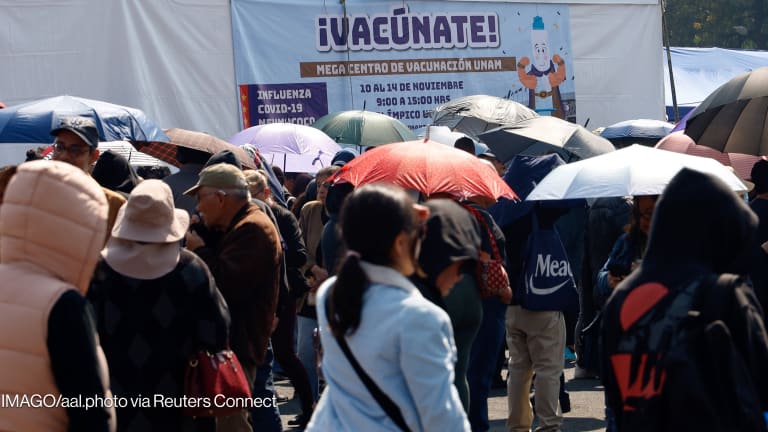
The U.S. Agency for International Development chief Gayle Smith has called upon the incoming Donald Trump administration to diversify how development is funded, continue to invest in fragile states, focus on resilience against disaster and continue to give USAID a seat at the foreign policy table.
Smith, who took over as administrator from Rajiv Shah in December 2015 and will step down in January of next year, shared her thoughts on USAID’s achievements during President Barack Obama’s eight years in office and outlined five recommendations for how Trump, and the wider development community, should continue to support the U.S. aid agency going forward.
Speaking at an Center for Global Development event in Washington, D.C., Smith said USAID was positioned to get “big and bold things done.”
Since 2008, the aid agency has saved the lives of 4.6 million children, facilitated the treatment of 11.5 million people with HIV, responded to 60 international crises, and mobilized $54 billion in funding from an initial $7 billion USAID investment for the Power Africa project, which works to increase the number of people with access to power, Smith said.
Republican aid professionals on what's next for aid in a Trump administration
It is difficult to know exactly what will happen in the Trump administration. But Devex spoke with several Republican aid professionals to get their predictions and recommendations for the next administration.
Under the Obama administration, USAID was elevated to have a “place at the foreign policy table,” Smith said, and she recommends the next administration continue to allow the aid agency to operate “on a par with cabinet level agencies”.
Smith said USAID also needs to be prepared to show it can “leverage” and stop programs which aren’t working, and expand programs which do. Talking about the current parts of USAID which she thinks will survive into the next administration, Smith said she would be surprised if the current work on innovation, data, evidence and evaluation were removed, but might expect it to be renamed. She also described the Global Development Lab as “new and extremely valuable addition to USAID”.
Smith admitted that there “could well be pressure on the foreign aid budget” under the Trump administration. She said USAID and its development partners need to respond by translating the importance of development investments into practical things and better understand how development can be linked to national security or economic imperatives and also faith-based values. This will enable development issues to cross party lines and gain more support, she said.
Bipartisan support from Congress has also been crucial to achieving consensus around a number of initiatives including Power Africa, the Global Food Security Act of 2016, which guaranteed funding for Feed the Future, the Obama administration program that invests in woman-owned farms, small farms and agricultural education programs in Africa, Asia and Central America, and the Foreign Aid Transparency and Accountability Act, which requires U.S. government agencies to closely monitor and evaluate all foreign aid programs and improve transparency by publicly sharing the data, she said.
USAID has also benefitted from greater interagency cooperation, for example 12 agencies collaborate on the Power Africa program, so much so that “we work together so seamlessly now we can literally finish each other’s sentences,” Smith said.
While Smith said she “can’t speak” to what the Trump White House will do regarding USAID, she offered five pieces of advice to both the incoming government and the development community, to help ensure USAID’s momentum is maintained.
1. Grow the constituency.
“Unfortunately there are still too many people who think foreign aid makes up 20 percent of the U.S. budget when it’s really less than 1 percent,” Smith said. Convincing them otherwise is the job of the development community by communicating clearly and simply “about what we’re doing and why we’re doing it,” she said.
This requires “nurturing” the bipartisan commitment to development which while strong, is “perishable,” she said. To do this, USAID and others need to offer Congress transparency, accountability and efficiency, and must strive to be “better stewards of taxpayers’ dollars” in order to gain the flexibility needed to do development in today’s challenging environment, Smith said.
2. Diversify how development is paid for.
In order to reduce developing country dependence on aid and ensure sustainable development funding, the approach to aid needs to be diversified, Smith said.
“We want to build economies where private capital can flow freely and responsibly and where governments put more skin in the game in the form of dollars invested through their own budgets,” she said.
Linked to this, being able to show U.S. dollars leveraging additional capital is also a message which “resonates and sticks” with Congress, Smith said.
3. Adapt systems and institutions for the world we live in.
Organizations including USAID need to reform the way they do business to respond to an “increasingly unpredictable” world, Smith said. As part of this, USAID has instituted a number of internal reforms including the evaluation policy implemented by its former administrator which requires performance evaluations to be conducted by independent third parties for all major projects. Shah also started the USAID Forward reform agenda.
Furthermore, the aid agency also recently approved a new policy banning contractors and implementers receiving USAID funding from discriminating against lesbian, gay, bisexual, transgender and intersex people when providing services.
4. Strategic patience is needed.
It could be difficult to “make the case” for USAID interventions in fragile states since the risks are high and the returns will not necessarily be seen for 10 to 15 years, Smith said. But working in fragile states is crucial, according to Smith. She said the Ebola outbreak which began in Guinea in late 2013, may not have evolved into an epidemic had it not started in a fragile state.
“Washington needs the strategic patience it takes to support transitions for the long term and to give transformation the time it needs to bloom,” she said.
5. Invest in trying to create a more stable future even as responding to immediate crises.
Today’s development challenges are spreading faster and are more volatile than ever before, Smith said, and this is illustrated by the fact that over the last two years, USAID has frequently had five Disaster Assistance Response Teams in the field at the same time responding to crises in Syria, South Sudan, Iraq, the West African Ebola outbreak, and drought in Ethiopia. Ten years ago the average number of DART teams in the field would have been one and a half.
While crisis response needs to continue, Smith said USAID is prioritizing investments in resilience so communities have greater capacity to withstand external shocks, and this policy should continue going forward.
Stay tuned to Devex for more news and analysis of what the Trump administration will mean for global development. Read more coverage here and subscribe to The Development Newswire.








